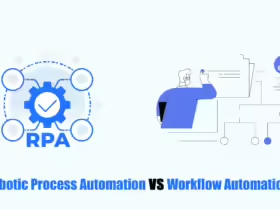Empowering employees in their work is becoming very popular. Companies find that empowered employees are happier, more motivated, and help the business succeed. But effective empowerment is more than just talk. It requires the right approach and clear processes throughout the company.
In this blog, we will answer the question: What is necessary for the success of employee empowerment?
Let’s dig deeper into the key factors for success.
What is Employee Empowerment?
Empowering employees is a way of managing your people by allowing them to make their own decisions and take action when they think it is necessary. This is the opposite of micromanagement, where employees don’t have that freedom.

If a company wants to empower its employees, here are some important things to do:
- Listen to employees: Regularly ask for their feedback and actually act on it.
- Help them grow: Give them the opportunity to take on more responsibility, work more independently, or even try a new position or job within the company.
- Recognize their good performance: Regularly acknowledge their contributions to increase their confidence and engagement.
- Give them what they need: Provide the right tools, environment, and authority for them to succeed.
Leaders, HR, and everyone else in the company are all important parts of creating a supportive and empowering workplace. People need to trust each other, feel comfortable taking risks, and have clear expectations and guidelines. Without this team spirit, true employee empowerment will not happen.
What is Necessary for The Success of Employee Empowerment?
You’ll see big improvements when you empower your team, but it takes focus to make it stick. Here are four steps to put into action.
Show Employees that Their Feedback is Valued
Many companies conduct annual surveys to check employee engagement levels. But many companies don’t really care about comments and have no intention of acting on them. As a result, employees often find filling out surveys tiring and pointless.

Conversely, if a company encourages employees to give regular, honest feedback and then make changes based on what they hear, employees will feel empowered at work. They will realize the importance and real voice at work. One study shows that 90% of employees will stay at a company that listens and changes based on their feedback.
Besides, most HR leaders agree – they think it’s important to have a way for employees to give feedback at all times. Therefore, how and when you collect feedback really matters. Think about using a tool that allows employees to share feedback whenever they want, such as a chatbot, along with regular, short surveys.
Make sure the feedback tool you choose shows leaders what keeps their employees engaged. Look for features like dashboards and heat maps that provide quick insights and help leaders know what to do in any situation.
Perceptions of Employee Empowerment
Showing appreciation is really important and makes employees feel more empowered. A study has found that companies that regularly recognize their employees have much higher levels of engagement. In fact, employees who feel recognized are more likely to recommend their company to others. Recognition also helps boost motivation and makes them want to work harder.
To empower employees through recognition, you can support, motivate and praise them. Recognize their achievements so they know you care about their success and believe in them. It’s important that recognition comes from everyone, from colleagues to managers to senior executives.

Recognizing actions that align with your company values will encourage employees to continue implementing them. That gives them the confidence they need to live by those values. Almost everyone said they would do something again if they were recognized the first time.
Using a special platform for recognition can create a more empowering environment, improve individual performance, and even boost customer satisfaction and company value.
Offer Opportunities for Career Growth
Professional development is an important part of employee empowerment in the workplace. Most young workers say that having the opportunity to develop skills on the job is the main factor keeping them in a business.
To help employees grow, encourage them to share what they know, take on new tasks, and attend conferences or events where they can learn and improve. Human resources departments should also create clear career advancement paths within the company. Even if employees feel empowered, they can still become discouraged if they don’t see a clear way to advance. Promoting people shows that hard work pays off.
Companies should also provide more coaching, mentoring and training programs to enhance learning and help employees become more oriented. It’s also important to create a safe and supportive environment where people feel comfortable learning and growing.
See Employee Empowerment as Part of the Organization’s Culture
Changing company culture to empower employees takes time and effort. When employees feel like their leaders listen to them, they feel empowered and perform better. Besides, to build an empowering culture, leaders need to focus on supporting their employees, not vice versa.

In particular, everyone in the company needs to be empowered, from HR and management to senior leaders and all other employees. Consider having experienced employees help new hires settle in, create mentoring groups or idea-sharing sessions, and find fun new ways for employees to connect with other departments.
When employees are empowered, it creates a strong and stable company culture that can handle any challenge – even big ones like a global pandemic.
Employee Empowerment Benefits
Here are some of the most important advantages of employee empowerment:
- Employees feel more motivated to do their best work.
- Everyone gets more done.
- The company has a more positive and supportive environment.
- People come up with more creative solutions to problems.
- Employees feel more confident when making decisions.
- Fewer employees leave the company.
- Employees trust their leaders more.
- Customers have a better experience.
- The company’s brand is viewed in a more positive light.
- Business is generally better.
Tips to Improve Employee Empowerment
There are eight tips to help you empower your employees:
- Assign people tasks that match their skills and knowledge.
- Provide clear instructions and expectations about how and when work will be completed.
- Be flexible and let employees adjust their work schedules as needed.
- Make sure employees have the qualifications they need to succeed.
- Focus on results instead of the process.
- Listen to employee suggestions to improve the way things work.
- Help employees develop important soft skills.
- Create a workplace where people can learn and develop themselves.
Conclusion
So you have the answer to the question: What is necessary for the success of employee empowerment?
To keep employees motivated and interested in their work, companies need to empower them. When employees feel their work is meaningful, it boosts their morale and makes them happier.









